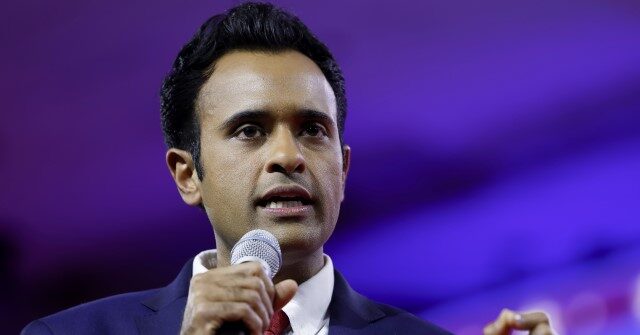

Republican presidential candidate Vivek Ramaswamy’s veteran policy platform includes taking “a holistic approach” to aid veterans during and after their time in service, including making marijuana, ayahuasca, and MDMA accessible for veterans as part of the treatment of post-traumatic stress disorder (PTSD).
Ramaswamy’s campaign shared his plan exclusively with Breitbart News before he officially unveils it on the trail in New Hampshire on Saturday, Veterans Day.
RELATED VIDEO — ”I Don’t Want to Lose You” Former Marine NYPD Officer SAVES Vet from Jumping Off Bridge:
NYPD/BODY CAMS+ /TMX
“As President, I will take a holistic approach to ensure Veterans receive the care they need to live long, flourishing lives — starting during their service and continuing in the decades that follow,” Ramaswamy’s policy plan states.
His plan for assisting in-service veterans includes creating “two-week decompression buffers” through the Department of Defense (DOD). This would be in a third location following a tour of duty separate from the United States and where the servicemember was in combat to ensure they “are able to slowly reacclimate to life away from the frontlines.”
He will also advocate for the DOD to implement guidelines encouraging servicemembers “to report PTSD under privacy protections” if elected. Under current guidelines, Ramaswamy believes “too many” servicemembers often do not report instances of PTSD due to fear of “permanent red-flags.”
If elected president, Ramaswamy would also seek to further the use of “alternative medicine to improve mental health” for veterans.
As part of the vision, Ramaswamy would “de-schedule schedule 1 drug restrictions that stand in the way of Veterans with PTSD enjoying access to substances that can assist in their treatment and recovery: marijuana, ayahuasca/DMT [Dimethyltryptamine], and MDMA [methylenedioxymethamphetamine],” according to the plan shared with Breitbart News.
These are a few of several drugs at the focus of a review of PTSD treatment published in the National Library of Medicine in October 2022.
RELATED VIDEO — V.A. Secretary: Afghanistan Collapse Hurt Veteran Mental Health, Proud to See Vets Still Working to Get Allies to U.S.:
“As this review highlights, psychedelic substances provide prospects for a revolutionary method of treating PTSD,” the review concluded. “Each of the examined substances has a distinctive potential, from their use to quickly target PTSD symptoms to their use as adjuncts to support psychotherapy.”
“More research is needed to determine the safety and efficacy of psychedelics and identify the patients for whom these treatments might be most effective,” the medical article noted, adding, “there is also a need to better comprehend the psychological states these psychedelic substances can induce.”
In 2020, the FDA expanded the use of MDMA, or ecstasy, for compassionate use to treat 50 people as it began the final stages of clinical trials in the United States, Canada, and Israel. One veteran named Jonathan Lubecky told Breitbart News at the time that he used to contemplate suicide daily before he took part in a clinical trial of MDMA-assisted psychotherapy in 2014.
“Five years later, I’m alive. I probably wouldn’t be,” he said. “It saved my life.”
Ramaswamy also sees outdoor therapy as a mechanism to improve mental health, noting he would “update guidelines to allow doctors to prescribe non-pharmaceuticals for treatment.”
The plan notes that “hiking, camping, and other outdoor activities” have yielded encouraging early results.
Another aspect of Ramaswamy’s plan is to direct the VA to expand community care provisions to improve “consistency in treatment” and to reduce wait times.
He will remove the “nonsensical restrictions that do not allow community care providers to take over future care needs for veterans who select” it, the plan states. He also seeks to give access to financial incentives for providers who reduce wait times, offer mental health services, and keep health records electronically.
To further combat wait time, Ramaswamy will direct the VA to allow for retroactive approvals for community care under his policy so veterans will not be “waiting for bureaucracy” and swiftly get care.
Another area of focus is expanding “opportunities for vocational education” within veterans’ educational benefits, including “massively” expanding “access to the Veteran Employment Through Technical Training (VET TEC) program” established in 2019.
“America must stop failing our veterans,” Ramaswamy declares in the plan. “Since 2001, an average of over 6,000 Veterans have committed suicide every year — meaning nearly as many vets die from suicide every year as died in 20 years of combat in Afghanistan and Iraq.”




